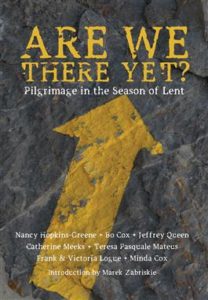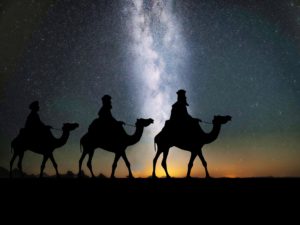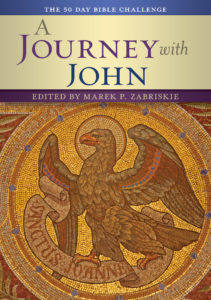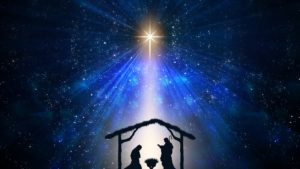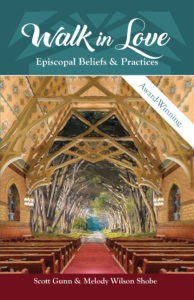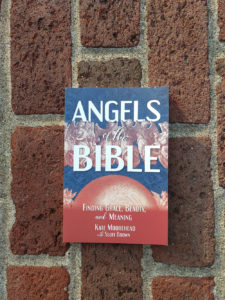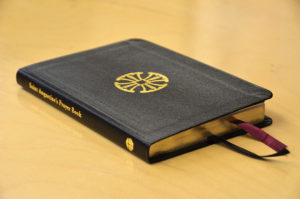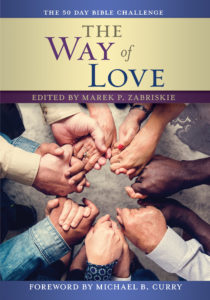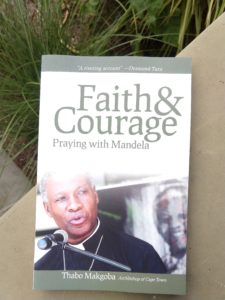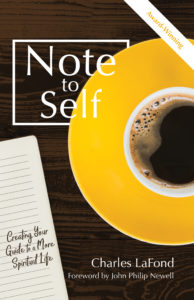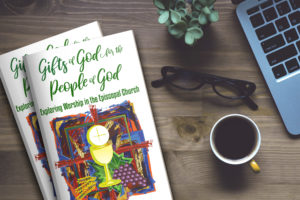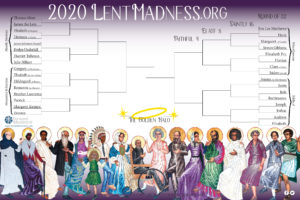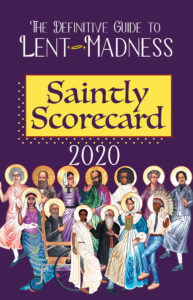Managing Editor Richelle Thompson recently chatted with Lindsay Hardin Freeman, author of the popular book Bible Women: All Their Words and Why They Matter, and Kate Moorehead, author of the newly released Angels of the Bible: Finding Grace, Beauty, and Meaning. You can also listen to this conversation in the December 6 episode of the Forward Day by Day podcast.
Listen on iTunes.
Listen on Spotify.
Listen on Stitcher.
…Or anywhere else you listen to podcasts!
Richelle: [00:00:43] Welcome to this conversation with two of our favorite Forward Movement authors. We have Kate Moorehead, author of Angels of the Bible: Finding Grace, Beauty, and Meaning, which has just been released. Kate is the dean of St. John’s Cathedral in Jacksonville, Florida. And we welcome Lindsay Hardin-Freeman, author of the best-selling Bible Women: All Their Words and Why They Matter. Lindsay serves as a priest at St. David’s Episcopal Church in Minnetonka, Minnesota. Both women are here today to talk with us about the role of women and the role of angels in the Bible.
Richelle: [00:01:27] So, Kate, Lindsay, we wanted to bring the two of you together because of your passion for exploring the Word of God and for digging deep into different aspects. We’re especially interested in chatting with you about the role of angels and the role of women in the Bible and how they intersect. We thought we’d start with the best, perhaps best-known interaction of a woman and an angel when Gabriel visits Mary and delivers the news that she’ll bear the Son of God. I want to invite folks to imagine yourself standing with Mary, a peasant girl living in Bethlehem as she hears these famous words from history. We witness what many would call the greatest moment in Christianity–and for us as Christians, the greatest moment in world history.
Let’s hear the story from the Gospel of Luke, the first chapter, verses 26-38: In the sixth month the angel Gabriel was sent by God to a town in Galilee called Nazareth, to a virgin engaged to a man whose name was Joseph, of the house of David. The virgin’s name was Mary. And he came to her and said, “Greetings, favored one! The Lord is with you.” But she was much perplexed by his words and pondered what sort of greeting this might be. The angel said to her, “Do not be afraid, Mary, for you have found favor with God. And now, you will conceive in your womb and bear a son, and you will name him Jesus. He will be great, and will be called the Son of the Most High, and the Lord God will give to him the throne of his ancestor David. He will reign over the house of Jacob forever, and of his kingdom there will be no end.” Mary said to the angel, “How can this be, since I am a virgin?” The angel said to her, “The Holy Spirit will come upon you, and the power of the Most High will overshadow you; therefore the child to be born will be holy; he will be called Son of God. And now, your relative Elizabeth in her old age has also conceived a son; and this is the sixth month for her who was said to be barren. For nothing will be impossible with God.” Then Mary said, “Here am I, the servant of the Lord; let it be with me according to your word.” Then the angel departed from her.
Richelle: [00:02:14] Kate, tell us about the angel Gabriel in this moment. Draw a picture for us.
Kate: [00:02:19] Well, as many of you know, angels are a great mystery to us, but we’re so blessed now with Quantum mechanics to be able to reconsider them as being possible, both physically and scientifically as well as mystically. So we’re thrilled to be able to come back to Gabriel in a way. The word Gabriel in Hebrew means the strength of God. We know that this angel was probably quite something visually. We know that angels were not mortal, so they didn’t procreate, which probably means the same gender–or maybe the word is transcending gender–but probably not male or female. We know that Gabriel was an archangel. So along the celestial hierarchy, he would have been rather low, believe it or not, and would have been visible to Mary and to human beings, whereas most of the angels in the hierarchy were not visible, at least not to the physical eye. Still I imagine he was something else to behold. I don’t think we can possibly fathom all of the appearance. There is great art depicting him in so many different ways. And I say him, because we’re used to that. But I could say her.
Richelle: [00:03:41] So Lindsay, Kate talked a bit about the angel Gabriel. Paint a picture for us of Mary. How do you imagine Mary is in this moment?
Lindsay: [00:03:50] Well, I imagine her as a girl of about 14, because that is just about when girls got married in that time. She was betrothed to Joseph, a carpenter, and he was an older man. She’s betrothed, and I believe she was excited about that moment. She is ready to get married. She’s ready to lead a normal life.
Lindsay: [00:04:27] We don’t have any sense of her having much money. I picture her in a home in Bethlehem, perhaps a two-story home, like many of the rudimentary homes of the day. Perhaps Mary is sweeping a dirt floor when the angel comes to her. There is no record of anybody being with her. So we have the sense of her being overwhelmed, because being a good Jewish girl, she knows ancient history. She knows there are good angels–and ones who deliver terrible news. Maybe in the back of her mind, she’s wondering is this is like the angel of death. I mean, this is this is a lot of trepidation for a 14-year-old girl just ready to get married to this handsome carpenter husband of hers.
Richelle: [00:05:24] It’s easier for me to imagine Mary. It’s still harder, I think, for me to picture Gabriel. Kate, what do you think the angel Gabriel looked like?
Kate: [00:05:40] There’s no denying that angels consisted of a huge amount of light. In some artistic depictions of Gabriel, he’s nothing more than this huge beam of light that sort of looks like it’s about to move. So we know he must have been blindingly bright. Most heavenly beings were filled with light. And we know that that he was different because he says, you know, don’t be afraid. You know that you’ve found favor with God. I’m not here to hurt you. So his presence must have been somewhat accosting initially. One of the first things angels often do is to reassure. That means that we as human beings are probably initially frightened by the what we call the apparition, the appearance of an angel.
Lindsay: [00:06:41] Kate, a minute ago in your wonderful description, you said that we can know about angels metaphysically and physically. Is there more evidence these days of what they might be?
Kate: [00:07:03] Well, we know now that there are so many dimensions that exceed our perception. So the reality that there could be beings that we can’t see is very true to science now. We exist in three dimensions and have time as a fourth\. But there are many more dimensions than angels can exist. So how angels integrate into our dimension and appear to Mary is one of those mystical questions. I don’t know the answer to that. Even when we describe the angel, it’s hard to find words that are adequate because we’re talking about such a mystical experience. So the only thing we can do is is to keep our minds and hearts open and be looking around for something that transcends language.
Lindsay: [00:07:50] So I guess that when we hear the phrase “the heavenly host,” we’re talking about these beings. I have a sense–and this is not biblical– that perhaps there was a little music there when Gabriel appeared to Mary.
Kate: [00:08:05] Oh, yes. I mean, primarily angels sing. Music is one of those things that transcends language as well and is able to affect our emotions in a more direct way than the spoken word or written word. So pure love, pure music, probably become one in some fashion. And what’s so interesting to me, Lindsay, is here we are talking about women and angels who have both been rather sidelined throughout much of history. And yet without this particular interaction of both an angel and a woman, we wouldn’t have Christianity. I think we can both come to an agreement that women and angels are quite important
Lindsay: [00:09:11] Yes, at both the beginning of Jesus’s life with great incarnation and also at the end with Mary Magdalene. That’s kind of an amazing bridge, when you think about it.
Kate: [00:09:32] It sure is. And the interaction between the two of them is so fascinating to me as well, because it’s not sexual. And you would think it would be because she’s being impregnated by the, by God. And yet at the same time, there’s no language of God overtaking her or anything like that. There’s a sense of God overshadowing, which is the same verb that’s used in the transfiguration when the cloud overshadows the mountain. But there’s a sense that God somehow empowers Mary or imbues Mary with the Holy Spirit in such a way that she becomes both God and human, both male and female somehow. But not that the angel takes her in any kind of a sexual way, but is more of a presence with her, which is gentler, which I like.
Richelle: [00:10:22] Lindsay, talk about this a bit from Mary’s perspective. I’ve not thought about that moment being a moment of conception or the idea of being with child of that very moment. What are your thoughts when Kate is talking about that?
Lindsay: [00:10:49] Kate and I tend to disagree on this question a little bit. I think that Mary had a choice in whether or not to accept this commission from God. Let me just say that that scholars over the ages have disagreed on this. One classic way of looking at it would be that Mary didn’t have a choice. But I think she did a choice. When I look over the great stories in our faith, starting with Eve leaving the garden, human beings have always had a choice of whether to do what they want or what God wants. Look at Jonah, when he went to the ocean to escape because he didn’t want to go to Nineveh. If you look at Eve leaving the garden, God certainly preferred that she not leave. But she did, and she encouraged Adam to do the same. When we look at all the great stories throughout the history of our people, the Judeo-Christian community, they have always had choices. So it seems to me that when Mary says, “God, let it be to me, according to your will,” that in that moment, there is a choice for her to say, “No. I don’t want it. I don’t want to do this, God.” Because if she had said that, I doubt God would have gone ahead.
Kate: [00:12:14] I agree with that. Very much so. I don’t know if it’s a yes or no question for her, but I do think that Mary actually absolutely agrees. And she absolutely echoes Isaiah when she says, “Here I am, a servant of the Lord.” And that’s the greatest response that we can have to God, which is “I’m here to do whatever it is that you want me to do.” When I say that God overshadowed her, I don’t mean to say overpowered her or didn’t give her a choice. But yet I think that in that presence that came over her, she was made more fully herself and was able to accept and able to be empowered in a sense. This was the absolute empowerment of a single woman to be able to agree to the greatest love in the world. So yes, in every way she was given choice but also given the capacity to answer. Does that make sense? Because of her young self, she might not have had the strength. She was overshadowed with a sense of strength and purpose.
Lindsay: [00:13:35] When we look at the concept of free will, we could say that God would not have known her answer, but that would from a linear, human perspective. I’m sure God picked somebody who God thought would say yes. But it’s important to me when I look at this passage to think of that choice: of whether or not to accept God’s Holy Spirit and of the tribulations that would certainly come with it. In a little while, of course, we’ll hear her hear that oft-repeated phrase: “She pondered these things in her heart.” All through her life, she was pondering. But just think of the grief that this poor woman went through.
Kate: [00:14:25] And the angel is very clear with her. I love how he tells the truth. He says that “a sword will pierce your soul too.” She’s going to experience pain and the angel is very clear with her about that. And she still agrees, which is marvelous.
Lindsay: [00:14:38] And isn’t it wonderful that this greatest challenge, perhaps in the history of biblical history and in human history, comes down to this young girl? I mean, you think about the world changing, and it’s all in the hands of a 13-, 14-, 15-year-old girl.
Kate: [00:14:57] Yeah, it is amazing. There’s a wonderful legend that I had heard about that—this is obviously totally extra-biblical, just a legend—but it says the angel Gabriel had actually been wandering the earth, asking who will bring the Christ child into the world. And Mary was the first one who said yes. So that’s another theory, which is that this had happened before. We don’t know.
Lindsay: [00:15:21] That would be a sign perhaps to understanding why God sent Gabriel to ask. I mean, would God be turned down by all these people? That is an interesting legend. I hope that’s not the case. But it’s an interesting story.
Kate: [00:15:39] Well, in a way, God is always asking. God asks all of us: “Will we bring Christ into the world in some fashion?” I think we all have to come up with our answers, don’t we? I mean all of us as Christians have to decide whether our purpose in life is to be his hands and feet and bring him into the world or not.
Lindsay: [00:16:00] It’s an interesting thought that spins the whole thing on its head, looking at David and everything that points toward Jesus’ birth and all those lines that go through in both Mary and Joseph’s biological background. It’s interesting to think about Gabriel wandering the earth with different cultures. That’s why it’s extra-biblical, I guess. It’s certainly interesting to consider.
Richelle: [00:16:32] This brings up the question for me. Lindsay alluded to it. Why doesn’t God just directly come to Mary? God speaks to other people directly and doesn’t use angels as kind of an emissary. And here is this pivotal moment in the history of humankind, and it’s Gabriel who is delivering the message.
Kate: [00:17:05] It’s true that God speaks to people. We know that in the story of the exodus, Moses very much wanted to see God but couldn’t see God. So God showed Moses his backside or in the Hebrew, “where he just was.” There’s a sense in which the human being can’t perceive God’s fullness. So the angel is meant to be something that we can see, something that is physical. Even if it’s just light, there is a being there for Mary to interact with. I think that in the mystery of God, God is always looking for ways to reach us. And for whatever reason, Mary needed this celestial interpreter or messenger to become accessible. It’s sort of like with my dog: I can’t explain the Pythagorean theorem to him, but I can get down on his level and telling him he’s a good boy and pat him on the head. I think God has to get down on our level in some way. God lifts us up through the celestial being, reducing the divine self into something that we can understand. I think Gabriel was something that Mary could see and understand.
Lindsay: [00:18:32] I wonder: maybe Gabriel was her guardian angel ever since birth. Perhaps Gabriel was assigned to the earth. You think of God being the God of the universes. And perhaps Gabriel’s assignment was right here.
Kate: [00:18:49] There have been associations of angels with stars and planets and perhaps different celestial beings that look over us. Maybe Gabriel just became visible to her in this moment but had been there from the beginning. So much of this is so far beyond our human brains and what we can fathom. But I do think that for this important of a conversation, Mary needed someone to look at.
Richelle: [00:19:32] Often in scripture when we encounter angels, one of the first things they say is “Don’t be afraid.” And here we are. Gabriel tells Mary, “You’re favored by the Lord, the Lord is with you. And, don’t be afraid.” So how do we hear that message today and why do you imagine Gabriel says this to Mary?
Lindsay: [00:20:07] I think whenever we hear the phrase, “The Lord is with you,” especially if you know your biblical history, that it’s a scary thing to think about it. Like, what the heck does that mean? And it’s not going to be what I had in mind, chances are. You think about all that biblical history when God was with somebody. And it’s pretty scary. So I think that that’s why Gabriel says several times, “Do not be afraid.” The world is going to turn on its head. But don’t be afraid; I’ve got you.
Kate: [00:20:42] Also, I think that to be in a relationship with God is to engage in life and change and growth. And fear is a natural response of the human being to any kind of change or growth because we are fallen creatures. We often want things to stay the same. We want comfort and safety. So it’s no surprise that any interaction with a celestial being that’s calling you into a higher form of living into change and growth is going to produce fear. So fear is a real part of the scripture in so many ways, and many of the great biblical characters are afraid almost all the time. Jesus himself was terrified in the Garden of Gethsemane. I think if we’re scared, it’s actually kind of a good sign—as long as it doesn’t derail us. And we certainly live in such a time of historic transformation with the Internet. I think people are scared all the time. We call it other words now: anxiety, stress. We’re scared. But that’s just a sign of life, of change and growth.
Richelle: [00:21:48] There are so many lessons in this story. The encounter between Mary and Gabriel and this whole moment is a hinge for humankind, a hinge for our Christian faith. What are some lessons that you take in your own life when you hear this story? How does it help shape your faith in your understanding of Christ?
Kate: [00:22:19] Well, I find it moving that, as Lindsay said, God would call a young girl. It reminds us that there is nothing about our reputation or our resumé that matters to God: Instead it has to do with the heart and the criteria that God has are so different from our human criteria. I also love that the angel points out Elizabeth to her and tells Mary to go see her cousin Elizabeth. God wants us to live in community. I remember having babies. There was nothing like being with another woman who was pregnant. I think God wants us to find support from one another. We may be afraid, but we’re not supposed to do this alone.
Lindsay: [00:23:01] I grew up thinking about Mary but the story didn’t really register with me until I became a mother. And then all of a sudden I started understanding Mary, who pondered things in her heart. She faced being scared—having to let her son go. Having to hear her son supposedly say, “Who is my mother? Who is my family?” She’s standing outside, wanting to get into to see Jesus, and he’s so preoccupied. And then at the very end, she watches him die just several feet from her. The way she accompanies her son through all these trials and tribulations and joy tells me the strength and power of this woman. These are powerful lessons for me as a mother.
Kate: [00:24:29] Any time a child is born to a woman, I think we sense the presence of an angel or God. I mean, the birth of a child is so mystical and so beyond our fathoming. It just blows you away. So it’s so marvelous that the incarnation begins in this manner of just talking with a woman and her having a baby. How much more divine can you get?
Lindsay: [00:24:59] Right, right. And sometimes Joseph’s role is underplayed, having this strong protective father, who listened to dreams. He responded and took care of his pregnant girlfriend. I mean, that’s pretty powerful, too.
Kate: [00:25:19] I’m grateful Joseph was willing to look bad. To be ashamed and to have people not like him. What a powerful, beautiful witness just to do the right thing!
Kate: [00:25:38] Yeah. The man never says a word, but he says a lot anyway.
Richelle: [00:25:48] A good lesson for all of us, right? Well, it’s been so wonderful to talk with both of you and to hear your stories and your insight. I know that this comes from a lot of years of research and prayer and deep devotion to spending time with God’s Word. Obviously, we did not cover the whole topic of Mary and Gabriel in this period of time, but is there something else that you want to add before we wrap up our conversation today?
Lindsay: [00:26:17] I think a great thing in this story of the Annunciation and in Mary’s life is just the whole sense of “Do not fear. I have wonderful things in mind for you.” And also the lesson to trust the young among us. They’ve got God’s world in their hands.
Kate: [00:26:39] And don’t be afraid if things hurt because sometimes the greatest things hurt on their way to accomplishing whatever God is doing. It’s a great perspective on our approach to pain, not to run away from it necessarily but to understand that just because you’re hurting doesn’t mean God isn’t working in your life.
Richelle: [00:27:00] Kate, Lindsay, thank you so much for your time today. I look forward to our next conversation as we explore the encounter of Eve with the cherub in the Garden of Eden. If you have questions for Lindsey or Kate or have a topic to suggest, please email us at editorial@forwardmovement.org. And we’ll pass them along.
Richelle: [00:27:19] Thanks for being with us today.

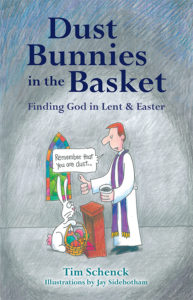 Episcopal priest Tim Schenck offers good humor and spiritual direction for the journey through Lent and Easter. With keen observations and a clever wit, Schenck connects the mundane with the divine, from dust bunnies and egg hunts to foot washing and the Easter Vigil. Illustrated by popular cartoonist Jay Sidebotham, Dust Bunnies in the Basket challenges us to go deeper this Lent, to “kick up some dust every now and then, to roll up our sleeves and get involved with the world and the people around us.” This book is ideal for personal reflection or seasonal study groups and includes thoughtful questions at the end of each section.
Episcopal priest Tim Schenck offers good humor and spiritual direction for the journey through Lent and Easter. With keen observations and a clever wit, Schenck connects the mundane with the divine, from dust bunnies and egg hunts to foot washing and the Easter Vigil. Illustrated by popular cartoonist Jay Sidebotham, Dust Bunnies in the Basket challenges us to go deeper this Lent, to “kick up some dust every now and then, to roll up our sleeves and get involved with the world and the people around us.” This book is ideal for personal reflection or seasonal study groups and includes thoughtful questions at the end of each section.




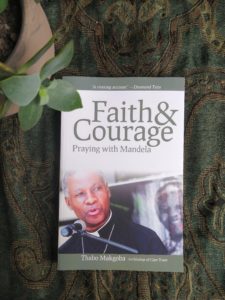
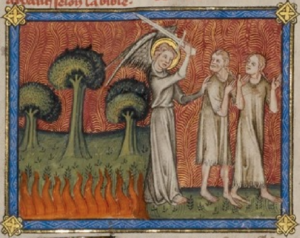 Forward Movement Managing Editor Richelle Thompson recently chatted with Lindsay Hardin Freeman, author of the popular book
Forward Movement Managing Editor Richelle Thompson recently chatted with Lindsay Hardin Freeman, author of the popular book 
